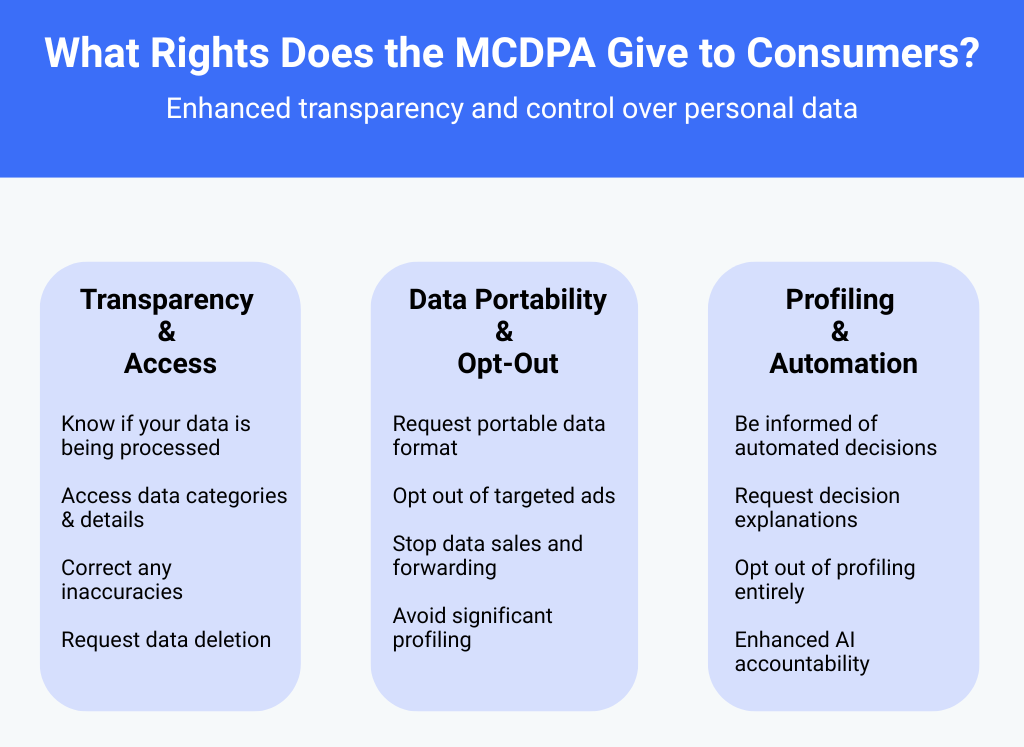Are you prepared for the new wave of data privacy regulations sweeping across the U.S.? If your business operates in or targets Minnesota residents, you need to start preparing now. The Minnesota Consumer Data Privacy Act (MCDPA) is set to take effect on July 31, 2025.
Much like the GDPR in Europe or the CCPA in California, the MCDPA empowers individuals with greater control over their personal information. However, it also introduces some unique rules—especially around profiling and data assessments—that set it apart from other state laws.
This blog breaks down the MCDPA’s scope, consumer rights, compliance steps, and enforcement details. Read on to get practical insights for your business.
The Minnesota Consumer Data Privacy Act (MCDPA) is a comprehensive state-level privacy law that grants Minnesota residents enforceable rights over how their personal data is collected, used, and shared. It imposes legal obligations on businesses to adopt transparent, fair, and accountable data practices across their operations.
The law was signed in 2024 and is set to take effect on July 31, 2025. It covers key areas such as consumer consent, limitations on profiling, mandatory data protection assessments, and detailed compliance documentation.
With rising consumer expectations around privacy, laws like the MCDPA reflect a national shift toward stricter data governance. For businesses, it’s not just a legal necessity but also a trust-building opportunity.
The MCDPA matters because it imposes detailed compliance requirements and significant penalties for violations. More importantly, it sets a precedent that could influence federal regulations in the future.
Not all businesses are subject to the MCDPA. It applies only to those that handle large volumes of Minnesota residents’ personal data or profit significantly from it.
The MCDPA applies to the following types of entities that meet specific thresholds under the law:
Understanding these thresholds is critical for determining whether your business needs to comply.
Several sectors are explicitly excluded from the MCDPA, either due to existing federal laws or institutional structures:
These exclusions ensure the law doesn’t overlap with existing federal or institutional frameworks.
The MCDPA introduces a strong set of consumer rights, making transparency and user control a top priority for any organisation handling personal data.

Minnesota residents will gain expanded data privacy rights under the MCDPA, granting them greater transparency and control over personal information.
These rights allow individuals to take control over their personal information in an informed and proactive way.
Consumers can request their data in a portable, readily usable format. They can also opt out of:
Offering these opt-out rights demonstrates a commitment to transparency and ethical data practices.
Profiling and automation present new legal obligations. The MCDPA gives consumers the right to:
This adds layers of accountability, especially for businesses using AI algorithms in marketing, hiring, or lending.
Complying with the MCDPA requires more than policy updates—it demands internal changes to how businesses collect, process, and respond to consumer data.
Your company must publish a clear and accessible privacy notice that outlines the following important information in a transparent way:
Creating a clear notice enhances consumer trust and legal defensibility, ensuring your business meets MCDPA requirements effectively.
Controllers must conduct risk assessments for any data processing activity that poses a significant risk to individuals, including cases that:
These assessments should be documented, reviewed periodically, and made available to the Minnesota Attorney General upon request.
You must respond to verified consumer requests within 45 days. This includes honouring opt-out preferences, correcting data, or deleting it entirely. Extensions of up to 45 more days may be permitted if requests are complex.
Businesses must also establish an appeals process for denied requests to ensure fairness and transparency.
The earlier you start planning for MCDPA compliance, the easier it becomes to avoid disruption and meet obligations confidently.
To stay compliant with the MCDPA, businesses should:
Taking these steps early can reduce risk, improve data hygiene, and streamline your compliance roadmap.
Non-compliance with the MCDPA comes with serious legal and financial consequences—here’s what enforcement looks like and how penalties are structured.
Enforcement is handled solely by the Minnesota Attorney General. While individuals cannot sue businesses directly, the Attorney General has wide authority to:
Each violation can lead to steep fines, particularly if multiple consumers are affected. The risk escalates for:
Beyond fines, businesses face reputational harm and potential loss of customer trust.
Minnesota strengthens its privacy environment with additional regulations that businesses must also respect to stay compliant and build trust.
Businesses must be mindful of Minnesota’s one-party consent law when recording calls or monitoring communications. At least one participant must consent to any recording, which aligns with the state’s focus on protecting individual privacy.
Failure to comply can result in legal exposure and reputational harm.
Under the Minnesota data breach notification law, businesses must disclose any data breaches that affect Minnesota residents. Notification must occur without unreasonable delay and include:
Failing to comply with the Minnesota data breach law can result in regulatory action and financial penalties.
Privacy isn’t just about compliance anymore—it’s a business differentiator that can strengthen customer loyalty and competitive positioning.
Ignoring the MCDPA could result in reputational damage and financial penalties. More importantly, consumers are increasingly expecting transparency and control over their personal data.
Getting your house in order today will prepare your business for not just the MCDPA, but also for any future federal legislation.
The MCDPA is more than just another compliance obligation—it’s a shift in how data should be handled across business operations. If your organisation handles the personal information of Minnesota residents, it’s time to act.
Start by mapping your data practices, updating your privacy documentation, and establishing clear opt-out mechanisms. Doing so will not only help you meet MCDPA requirements but also demonstrate to your customers that you take privacy seriously.
Don’t wait until the deadline. Prepare now—and lead the way in responsible data stewardship.
Tired of struggling with global privacy laws and updates? Let Seers AI handle it all. Our AI-powered CMP delivers one-click compliance across MCDPA, GDPR, CCPA, and beyond—so you never miss a regulation.
Start Free NowMCDPA aligns with CCPA/GDPR on rights like access, deletion, and portability, but it also introduces distinctive mandates—such as mandatory privacy officer appointment, profiling transparency, and formal risk assessments—making compliance more structured and rigorous than many other laws.
Under MCDPA, profiling refers to any automated processing aimed at evaluating, predicting, or influencing individuals’ personal preferences, behaviours, or performance. Absent explicit user consent, businesses must allow consumers to opt out and provide transparent explanations of such profiling mechanisms.
Yes. Minnesota’s one-party consent rule means that businesses must secure consent from at least one recording party before capturing calls or communications. MCDPA compliance cuts deeper: it also restricts profiling and personal data use tied to those communications, demanding informed notice plus streamlined opt-out options.
Under Minnesota’s data breach notification law, businesses must report any breach affecting residents “without unreasonable delay.” Notifications must include affected data types, incident details, response measures, and contact information. While MCDPA governs data use, the breach law ensures transparency in incident response and consumer protection.


United Kingdom
24 Holborn Viaduct
London, EC1A 2BN
Get our monthly newsletter with insightful blogs and industry news
By clicking “Subcribe” I agree Terms and Conditions

Seers Group © 2026 All Rights Reserved
Terms of use | Privacy policy | Cookie Policy | Sitemap | Do Not Sell or Share My Personal Information.